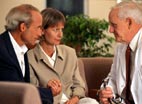Synopsis: Ann was 26 and the mother of two young girls when she presented with symptoms of rectal bleeding, stomach pain and weight loss. Soon after, she had endoscopic screening and was diagnosed with FAP. Despite the absence of FAP in her family history, each of Ann’s eight siblings were examined endoscopically for signs of the disease. No polyps were discovered in any family member, which indicated that Ann had a spontaneous mutation of the APC gene. Ann’s daughters began endoscopic screening at ages 10 and 8.
Two years later, Ann and her daughters were invited to participate in a study assessing the psychological effects of APC gene testing on children. After extensive pre-test counseling, they all consented to undergo testing. The results revealed that both girls inherited their mother’s APC gene mutation. They continued regular screening. Polyps were eventually found in both girls, who subsequently had surgery.
(Note: In cases of classic FAP, polyps typically appear around age 15 and the average age for colon cancer to develop is 39. There is also an attenuated form of FAP, characterized by fewer polyps that typically appear in patients in their 30’s. In the attenuated form, colon cancer develops at an average age of 51).
APC testing is a rare example of gene testing considered to be appropriate for children. Given that a negative test result can eliminate the need for invasive endoscopic screening and a positive result can lead to early diagnosis and better treatment, the medical benefit of testing is clear. There are, however, important psychological and social risks associated with the test for both children and adults.
- Given the medical benefits of APC testing, many providers would be strongly inclined to recommend the test. How “directive” should a clinician be in recommending the test? How would you describe to patients and families the psychological and social risks involved with APC testing?
- What would you say to parents who preferred to avoid APC gene testing for their children due to potential stigma, discrimination, self-image problems, or other psychosocial effects?
- How much (if any) autonomy should at-risk adolescents have in deciding whether they want an APC test?
- Though this is a high functioning family that has coped extremely well with the disorder, there is nevertheless a great deal of guilt and anger on the mother’s part for passing FAP to her daughters and a sense of “survivor guilt” on the part of the father who does not share this disorder. These feelings and attitudes have profoundly affected the family. If they were your patients, what, if anything would you do to manage the psychosocial effects of FAP on the family?


